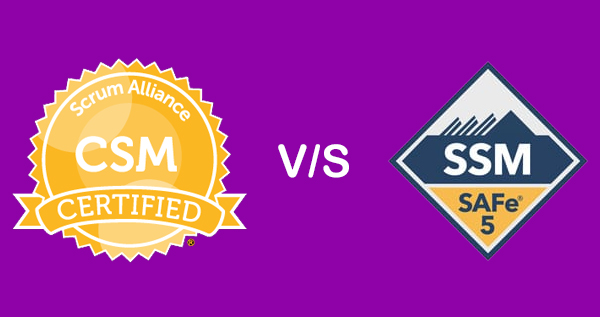
CSM stands for Certified Scrum Master whereas SSM is the abbreviated form of SAFe (Scaled Agile Framework) Scrum Master. These certifications prove to be instrumental in shaping the career of both beginners and experienced professionals. However, there lies a huge confusion among aspiring SSM and CSM practitioners as to which is the better or suitable training program or what are the main differences between these certifications.
Let’s try to solve all these dilemmas one by one and therefore, let’s start with the key differences among these certifications:
| Features | SSM | CSM |
| Accreditation organization | Scaled Agile Framework | Scrum Alliance |
| Requirements | Apart from the knowledge about hardware and software processes, one needs to have idea about Agile principles and concepts and knowledge of XP (Xtreme Programming), Scrum and Kanban. | A beginner with some knowledge about software development |
| Difficulty Level | Difficult | Easy |
| Exam Type | MCQs (Multiple Choice Questions) | MCQs |
| Exam Duration | 1 hour 30 minutes | 1 hour |
| Number of questions | 45 | 50 |
| Eligible professionals | Newly appointed Scrum Masters, Team Leaders, RTEs (Release Train Engineers), beginners or experienced users of Kanban development, etc. | Project Managers, BAs, Quality Analyst Managers, Team Leaders, Software Developers, etc. |
| Learning opportunities |
|
|
Benefits of completing CSM and SAFe Certifications
- As stated earlier, CSM (Certified Scrum Master) enables a candidate to know about the elementary concepts of Agile and Scrum. It also helps candidates to improve their knowledge of the Scrum Framework that eventually makes them aware of its importance and assists them during the implementation of the Scrum Framework in their organization.
- CSM helps them to understand the value of accountability, and iterative processes to establish organizational goals and teamwork. As a result, they will be able to take up an important role in the Scrum team or can even undertake the responsibilities of a Scrum Master.
- A professional with CSM Certification is responsible for improving the communication between teams and team members and helps his team to achieve their goals by organizing and managing them.
- SSM Certification will enable the candidates to resolve scaling issues in their organization that is hard to be resolved with the help of a basic Scrum framework.
- By implementing the Scaled Agile Framework, an SSM i.e. a SAFe Scrum Master will be able to enhance the quality of the product and minimize the communication gaps between multiple teams of an enterprise.
- With Scaled Framework, an organization can induce important changes in its work culture and develop stronger and wiser leaders within each team.
- As a result, the productivity of an organization grows noticeably as an SSM manages various responsibilities like collaborating with various teams, aligning the responsibilities and outcome of agile teams, etc. through the implementation of the SAFe Framework.
- With CSM, a candidate will learn events such as Sprint Review, Retrospective, Sprint Planning, etc. whereas, with an SSM Certification, a candidate will gain knowledge on team events such as Iteration Retrospective, Daily Stand Up, Iteration Review and Planning, etc. Also, a SSM will learn program-level events such as Increment Planning.
- A CSM professional mostly interacts with a PO (Product Owner) and his team whereas an SSM has to interact with his team, Release Train Engineer aka Program Manager, Scrum Masters, Product Owners, Product Managers, and various other entities or stakeholders of an enterprise.
Impact of CSM and SSM in the career
CSM has been around for quite some years now and therefore, it is one of the most recognized certifications among various organizations. However, SSM is also popular as it develops the pragmatic thinking of the Scrum Masters and helps them to contribute greatly towards the building of a better organization.
SAFe Scrum Master can implement the Scaled Framework over any existing structure of the business and will help an organization to receive the Agile benefits in a relatively short period. Therefore, professionals who are willing to enter and work in the SAFe environment would try to obtain the SSM Certification first.
CSM can prove to be effective in providing exposure to Agile and Scrum concepts only if the training program is conducted by a professional and experienced Certified Scrum Trainer.
For whom are the CSM and SAFe Certifications?
CSM certification is for the candidates who want to grow their understanding of Scrum and learn some basic concepts of Agile. SAFe Scrum Master is for the professionals who want to learn the basics of how to coordinate work and scale in a large organization along with a large number of teams.
SAFe Scrum Master certification is based on the Scrum framework and therefore, it is recommended that the candidates complete CSM first and then grasp Scaling and other high-level concepts.

